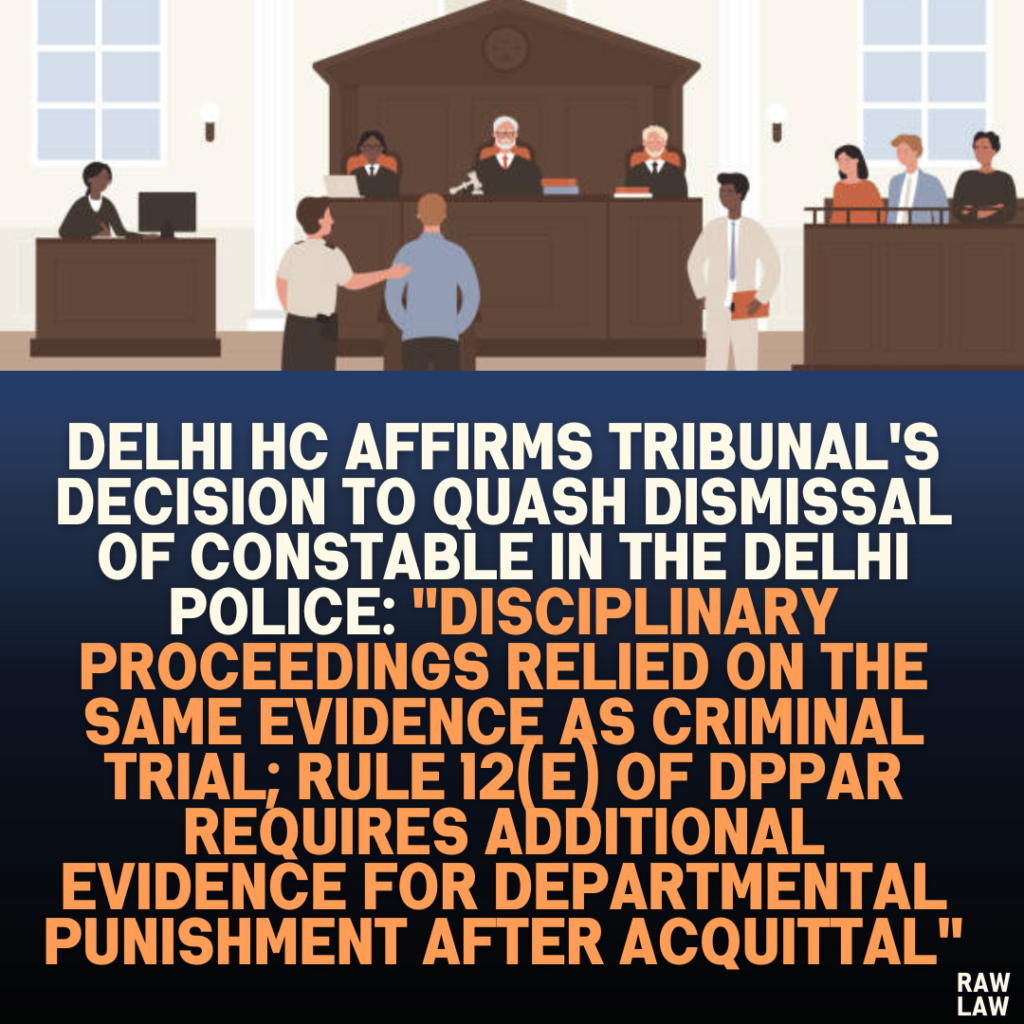Court’s Decision
The Delhi High Court dismissed the writ petition filed by the Commissioner of Police and others, challenging the order of the Central Administrative Tribunal (CAT), which had quashed the respondent’s dismissal from service. The court upheld that Rule 12(e) of the Delhi Police (Punishment & Appeal) Rules, 1980 (DPPAR) explicitly requires “additional evidence” to justify departmental punishment after judicial acquittal. In this case, as no such evidence was found, the respondent’s dismissal was invalid.
Facts
- The respondent, a constable in the Delhi Police, faced allegations that he had submitted inconsistent application forms, including one intended for another person, while applying for the position of Sub-Inspector in 2010.
- Following these allegations, an FIR under Section 419 IPC (cheating by personation) was filed against the respondent.
- Criminal proceedings culminated in the respondent’s acquittal on August 1, 2016, by the Additional Chief Metropolitan Magistrate (ACMM). The acquittal was based on the absence of sufficient evidence.
- Despite his acquittal, the respondent was dismissed from service through disciplinary proceedings concluded on December 21, 2011. The authorities defended this action under Rule 12(e) of the DPPAR.
- Post-acquittal, the respondent approached the CAT in OA 1223/2023, challenging his dismissal as violative of Rule 12(e), which bars departmental punishment based on evidence already examined in criminal proceedings unless additional evidence is available.
- The CAT ruled in favor of the respondent, observing that the disciplinary proceedings relied on the same evidence and witnesses as the criminal case, without introducing any additional evidence.
- The Commissioner of Police challenged the CAT’s decision before the Delhi High Court.
Issues
- Key Legal Issue: Whether the respondent’s dismissal was valid under Rule 12(e) of the DPPAR, given his acquittal in criminal proceedings.
- Additional Evidence: Whether the petitioners could rely on any additional evidence to justify the dismissal.
Petitioner’s Arguments
- The petitioners argued that departmental proceedings are independent of criminal proceedings, and the respondent’s acquittal did not preclude disciplinary action.
- They maintained that the dismissal was lawful under Rule 12(e), which allows punishment if sufficient evidence supports departmental charges, even after acquittal.
Respondent’s Arguments
- The respondent contended that his dismissal violated Rule 12(e), as the disciplinary proceedings relied on the same evidence and witnesses as the criminal trial, which had resulted in his acquittal.
- He argued that Rule 12(e) prohibits departmental punishment in such circumstances unless new or additional evidence is presented, which was absent in this case.
Analysis of the Law
- Rule 12(e) of DPPAR: This rule governs actions following judicial acquittal, specifying that police officers cannot be punished departmentally based on the same evidence used in a criminal trial unless additional evidence is available.
- The court emphasized that this rule protects employees from double jeopardy, ensuring that acquittal in criminal proceedings cannot be undermined by departmental actions unless fresh or independent evidence is produced.
- The court reiterated the importance of distinguishing between new evidence and a mere re-examination of previously presented evidence. In this case, the petitioners failed to introduce any additional evidence.
Precedent Analysis
The court referred to a similar judgment in OA 1428/2019, where the CAT had quashed a dismissal order on identical grounds. The CAT’s decision was later upheld by a coordinate bench of the Delhi High Court in WP(C) 11751/2024, decided on October 4, 2024. The consistency of judicial interpretation further validated the CAT’s findings in this case.
Court’s Reasoning
- Same Witnesses and Evidence: The court observed that the disciplinary proceedings relied on the same set of witnesses and evidence presented during the criminal trial.
- No Additional Evidence: As no fresh evidence was introduced, the dismissal could not be justified under Rule 12(e).
- CAT’s Findings: The court endorsed the CAT’s conclusion that the departmental proceedings were based entirely on evidence already evaluated and rejected by the criminal court.
Conclusion
The High Court dismissed the writ petition, holding that:
- No additional evidence was available to justify the respondent’s dismissal under Rule 12(e).
- The CAT’s decision to quash the dismissal was legally sound and consistent with precedent.
- The disciplinary authorities were directed to comply with the CAT’s order within four weeks.
Implications
- Impact on Disciplinary Actions: The judgment reinforces the principle that disciplinary proceedings cannot undermine judicial acquittals unless supported by new evidence.
- Safeguards for Employees: This case highlights the importance of Rule 12(e) in protecting employees from duplicative or arbitrary actions post-acquittal.
- Consistency in Application: The decision underscores the judiciary’s consistent interpretation of Rule 12(e), ensuring fairness and adherence to due process in disciplinary actions.



